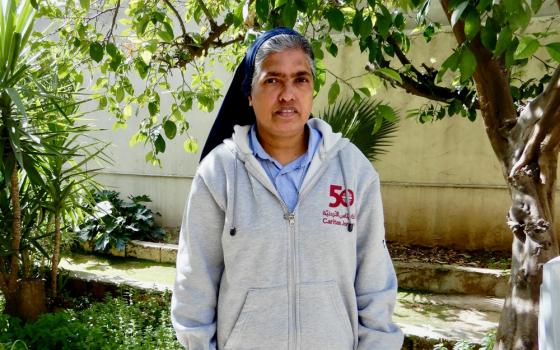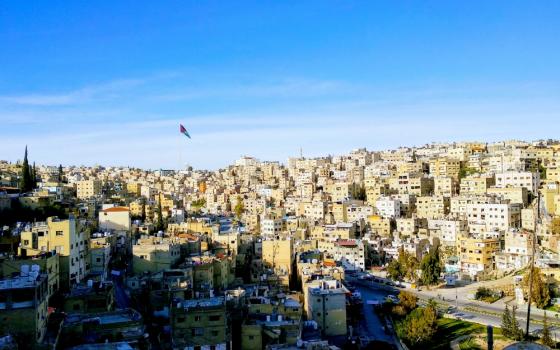The private homes in Amman's richest neighborhoods have sweeping views of the city's rolling hills and private courtyards filled with lemon trees and bougainvillea flowers.
But behind the high walls of the city's richest homes are thousands of migrant workers, many of whom are live-in domestic help and have little recourse against abusive bosses, unpaid wages or unsafe working conditions.
Sr. Theresa Perera of the Sisters of the Divine Savior (Salvatorian) congregation has spent the last seven years in Amman working with the migrant workers, advocating for their rights and building a community. A trained nurse from Sri Lanka, Perera spends the weekdays helping migrant workers obtain the health care they need with Caritas Jordan and the weekends planning gatherings and outings for migrant workers to ensure they have a bit of fun amid their busy work schedule.
Global Sisters Report visited Perera at Caritas, a large health care provider in Amman, especially for vulnerable populations like migrant workers who often do not have health insurance.
GSR: What kind of people do you work with?
Perera: Most of the migrants are from Sri Lanka and the Philippines, but there are also migrants from Bangladesh and Kenya. We also have Sudanese refugees.
Most work cleaning houses or offices. Some work in factories. Some of them live in the homes where they work. Some have work permits; some do not. Some were taken to work as domestics in homes with bad conditions. Maybe they had a work permit when they arrived, but they were kept in the home for a long time, and then when they leave, suddenly they do not have a work permit anymore and can go to prison.
We always encourage people: If you're here working, make sure you have a work permit. If you are staying in a home, make sure it's safe.
When we go back to Sri Lanka for a visit, we also do awareness there for people who are going to work abroad. We tell them: These are your rights; this is what you deserve. We do this work with a Buddhist monk because most people are Buddhist in Sri Lanka. We try to find people who are planning to go abroad for work, and we educate them about their rights.
What are some of your challenges?
We call the people working in houses day and night "full-timers." The "part-timers" live on their own and have more freedom, but the full-timers have a lot of difficulties. Sometimes the full-timers are not paid, or they are not given free time.
We try to talk to the workers, and we talk to their bosses if we can. For example, maybe they are Catholic, and the boss won't let them go to Mass. So we might try to go to the boss and talk to them and encourage them to let their employees go to Mass.
Sometimes workers are afraid for us to be in contact with their bosses. Sometimes they don't get paid enough or they won't get their visa renewed because their boss doesn't allow it. Sometimes they are prisoners because the boss locks the door to the house and keeps them inside.
There was an issue when I first came in which workers were locked in houses and to get out, they were jumping out of second-story windows and injuring themselves. They would break limbs or hurt their back, but that stopped a few years ago.
What are some of the things you do?
We have an annual Christmas party and give them gifts. We also visit the factory areas once a month and bring them small gifts and toiletries because it is hard for them to leave the factory area since it is far away. Otherwise, we would never see the factory workers. Most of the factory workers are from Bangladesh, and the domestic workers are from Sri Lanka and the Philippines.
We also try to connect workers to their families at home. We try to remind them to keep the aim of why they came here, why it's important to keep in contact with your children and parents back in Sri Lanka. Sometimes, people forget why they are here. They have a family back at home, but they meet someone and get together with someone here. They can really ruin their lives.
We also visit the prisons if migrant workers are imprisoned. It's a program through the Latin church and the Mother Teresa sisters. We are a big group, and we go to the prison together. Sometimes, migrants are imprisoned because their visa expired and they can't pay the fine. We try to raise money to pay the fine and also buy their ticket home. They can be in prison for three to eight months if they can't pay the fine while their case goes to court.
How did your congregation come to work in Amman?
We had a sister in Nazareth, Sr. Ursula Hopfensitz from Germany. She wanted to go from the Nazareth convent to the convent in Syria, and you can't travel directly between the two. [There are no border crossings between Israel and Syria because of the geopolitical situation.] So she would pass through Jordan on her way between the two, and when she was here, she saw there are many Sri Lankans in Amman. So she went to our congregation in Sri Lanka and said, "We should start a program for migrant workers. Send me a sister because I don't speak the language, and we'll do it together." That was 16 years ago, and we've been here since.
You also work in health care here. Tell me about your background.
I did a year certification program as a nurse. Before I came here, I was working with the elderly at a home in Sri Lanka for 14 years. It was a big home for the elderly, with 200 people. I really loved that work. Now I am happy here, too, but in the beginning, it was hard for me to leave that place.
During the week, I work at Caritas in Amman. When migrant workers come with health problems, we take their information, including where they work and live and how much salary they get. We help them see the doctors, and the doctors recommend tests or medicine. They come back here, and we see if we can help pay for their medicine or get them the tests they need. We can pay different amounts according to our budget.
What is your favorite thing about your work?
It's been very busy. We were two sisters, but Sister Ursula went back to Germany, and her replacement only was here for a few months. I am waiting for another sister to join me.
There's not enough time, especially since I'm at Caritas five days a week. But I really like when sometimes we take the migrant workers on outings to Aqaba [a city on the Red Sea] or the hot springs. Sometimes, when we are together, it is the only time they are not working. Every day, they are working and working, and then we come to church and we sing together.
[Melanie Lidman is Middle East and Africa correspondent for Global Sisters Report. She is based in Israel.]



